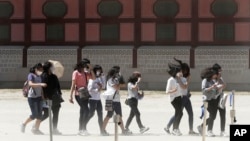In South Korea the number of confirmed cases of MERS, the Middle East Respiratory Syndrome (MERS) rose to 30 Wednesday but the death toll from the disease remains at 2. So far, public reaction to the outbreak of this deadly disease has been mixed. Most residents of Seoul say concerns about the spread of MERS have not made any significant impact on their daily lives.
On the streets of Seoul, some people like Chung Young-sun are now wearing masks to protect themselves from coming in contact with the deadly MERS virus.
She said that even though one cannot get infected through the air, she heard there is a danger that MERS can be spread by the moisture people emit when they breathe.
Most people in Seoul are not wearing masks or other protective gear. Shoppers and commuters are still going about their daily routines, but there is concern that that could change if people start avoiding crowded public places that could increase the risk of exposure to the virus.
In the last few weeks the MERS outbreak in South Korea has become the largest outside of the Middle East, although authorities have tried to reassure the public that the outbreak is now being contained. All of the new cases reported in the last couple of days have come from the roughly 1,000 people who have already been quarantined or isolated. And four of the five most recently confirmed cases were found in the same hospital, where the first Korean patient to contract the virus was found.
However concerns over possible exposure to MERS have already affected the tourism industry. The Korea Tourism Organization estimated that about 2,000 Chinese and 500 Taiwanese have already cancelled trips to South Korea. Tour operators say tens of thousands of potential visitors, Chinese tourists in particular, could likely opt to visit Japan over South Korea if the outbreak persists.
But many of the international tourists who gathered at the Deoksugung Palace to watch the re-creation of a historic changing of the guard ceremony see no cause for alarm.
Sakamoto, a visitor from Japan, said the news about the MERS outbreak in Korea did not dissuade her from visiting.
She said she came to South Korea after reading a news story about MERS but she didn’t really worry about it so she made a reservation and came to Seoul.
Leanne Creasey from the United Kingdom said the risk of exposure to MERS in Seoul is not nearly as great as the media is portraying it to be.
“I don’t think there have been that many cases of it here. And I don’t feel like just because there is a lot of media coverage or something, that I should necessarily believe that it is going to be that dangerous,” said Creasey.
Despite the relatively small number of infections, the MERS virus raises worries because of its high fatality rate. On average one in four people infected with it die as a result, although most of those who died also had other serious health issues. And there is no known cure or vaccine.
MERS is a respiratory illness that initially produces flu like symptoms but can escalate to pneumonia and kidney failure. The first case was identified in Saudi Arabia in 2012.
As a precaution, the Ministry of Education has canceled classes in more than 200 schools, most of them located in the Gyeonggi Province, where a 58-year-old woman who was infected with the virus died on Monday. But the affected schools account for only about one percent of the 20,000 schools nationwide.
South Korea has also instituted an international travel ban for anyone who has been exposed to MERS. The ban was imposed after a Korean businessman who was reportedly exposed to a MERS carrier in Seoul travelled to China through Hong Kong before he was diagnosed with the disease. China and Hong Kong have also quarantined or isolated a large number of people who may have been exposed to him.
VOA Seoul Producer Youmi Kim contributed to this report.





